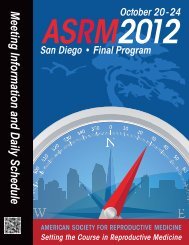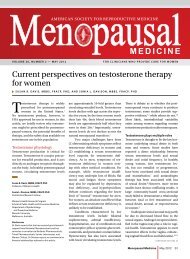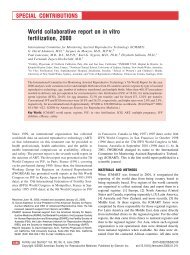scientific program • symposia - American Society for Reproductive ...
scientific program • symposia - American Society for Reproductive ...
scientific program • symposia - American Society for Reproductive ...
You also want an ePaper? Increase the reach of your titles
YUMPU automatically turns print PDFs into web optimized ePapers that Google loves.
SCIENTIFIC PROGRAM <strong>•</strong> SYMPOSIA<br />
Tuesday, October 18, 2011 11:15 am – 1:00 pm<br />
Symposium<br />
THE ART OF MAKING ART<br />
Presented by the Association of <strong>Reproductive</strong> Managers Professional Group<br />
Kira Copperman, L.M.S.W. (Chair)<br />
KBC Consulting<br />
Jackie Meyers-Thompson<br />
J.D. Thompson Communications/Coppock-Meyers Public Relations<br />
Needs Assessment<br />
Technology moves as fast in the field of marketing and<br />
communication as it does in medicine. With the advent<br />
of social media, designer radio and Internet-based referral<br />
<strong>program</strong>s, what does your practice need to know about<br />
achieving the right mix of accessibility, transparency and<br />
communication, all the while maintaining a positive profile<br />
and patient privacy?<br />
Many practices are also trying to determine how to<br />
effectively spend their marketing dollars and how to<br />
measure the impact of those ef<strong>for</strong>ts. The ARM member<br />
survey results have consistently identified the need <strong>for</strong><br />
practical in<strong>for</strong>mation about marketing from practice<br />
managers, administrators, physician managers and nurses.<br />
Room 224 C/D<br />
72<br />
Learning Objectives<br />
At the conclusion of this session, participants should be able<br />
to:<br />
1. Identify at least three different approaches to marketing<br />
a reproductive medicine practice now.<br />
2. Formulate a budget <strong>for</strong> marketing and determine how to<br />
measure the impact of a campaign.<br />
ACGME COMPETENCY<br />
Systems-based Practice<br />
TEST QUESTION:<br />
After participating in this session, I will do the following in my<br />
practice:<br />
A. Work without a marketing plan or budget.<br />
B. Create an up-to-date marketing plan that is within my<br />
budget and determine an effective way to measure the<br />
impact.<br />
C. Have a marketing plan but not measure impact.<br />
D. Spend all of my marketing dollars in an online campaign.<br />
E. Not applicable to my area of practice.<br />
Tuesday, October 18, 2011 11:15 am – 1:00 pm<br />
Symposium<br />
Room 224 E/F<br />
WHEN LEGISLATION ENDANGERS YOUR PATIENT CARE -<br />
FIGHTING “PERSONHOOD” BILLS IN THE STATES<br />
Sean Tipton (Chair)<br />
ASRM Office of Public Affairs<br />
Andrew A. Toledo, M.D.<br />
<strong>Reproductive</strong> Biology Associates<br />
Stephanie K. Dahl, M.D.<br />
MeritCare <strong>Reproductive</strong> Medicine<br />
Barbara L. Collura<br />
RESOLVE<br />
Needs Assessment and Description<br />
State legislatures throughout the country have seen ef<strong>for</strong>ts<br />
to establish legal personhood beginning “at any stage of<br />
development.” What would such legislation mean to your<br />
ART practice, and how can you fight against it? Join this<br />
panel discussion to learn how your colleagues from around<br />
the country have fought against these laws.<br />
Learning Objectives<br />
At the conclusion of this session, participants should be able<br />
to:<br />
1. Describe the potential impact of so-called personhood<br />
legislation.<br />
2. Identify tools to fight its passage.<br />
ACGME COMPETENCY<br />
Systems-based Practice<br />
TEST QUESTION:<br />
Personhood legislation<br />
A. Is a passing trend in the political arena.<br />
B. Is consistently defined in each state.<br />
C. Has significant potential impact on ART practice.<br />
D. Has already passed in several states.<br />
Tuesday, October 18, 2011 11:15 am – 1:00 pm<br />
Contraception Day Case Presentation/Panel Symposium<br />
OBESITY AND CONTRACEPTION<br />
Alison B. Edelman, M.D. (Chair)<br />
Oregon Health & Science University<br />
Bliss E. Kaneshiro, M.D., M.P.H.<br />
Oregon Health & Science University<br />
Needs Assessment and Description<br />
Women and healthcare providers rely heavily on contraceptive<br />
methods not only <strong>for</strong> the prevention of pregnancy, but also <strong>for</strong><br />
the protection, management, or treatment of many diseases<br />
and conditions. As the obesity epidemic continues to expand, it<br />
is important to understand how contraception and obesity might<br />
interact. Using a combination of didactics, clinical cases, and a<br />
panel discussion, this interactive session will address issues pertaining<br />
to obesity and contraception including but not limited to the safety<br />
and efficacy of contraception in obese women and the effect of<br />
contraceptive use on a woman’s weight.<br />
Learning Objectives<br />
At the conclusion of this session, participants should be able to:<br />
1. Discuss the impact of hormonal contraception on<br />
Room 230 A/B<br />
baseline weight and how to counsel women regarding<br />
this concern.<br />
2. Describe the current evidence regarding the impact of<br />
obesity on contraceptive efficacy.<br />
3. Review the current prescribing recommendations <strong>for</strong><br />
contraception in obese women, those who are postbariatric<br />
surgery, and those with additional comorbidities.<br />
ACGME COMPETENCY<br />
Medical Knowledge, Patient Care<br />
TEST QUESTION:<br />
A 30-year-old obese female patient is requesting contraception and is<br />
concerned about further weight gain. After participating in this session,<br />
in my practice, I will counsel patients that:<br />
A. Medroxyprogesterone acetate has been conclusively linked to a<br />
10 lb weight gain in the first year of use.<br />
B. Combined oral contraceptives have not been proven to cause a<br />
weight gain.<br />
C. Obese women at any age should not use combined oral<br />
contraceptives.<br />
D. Not applicable to my area of practice.








